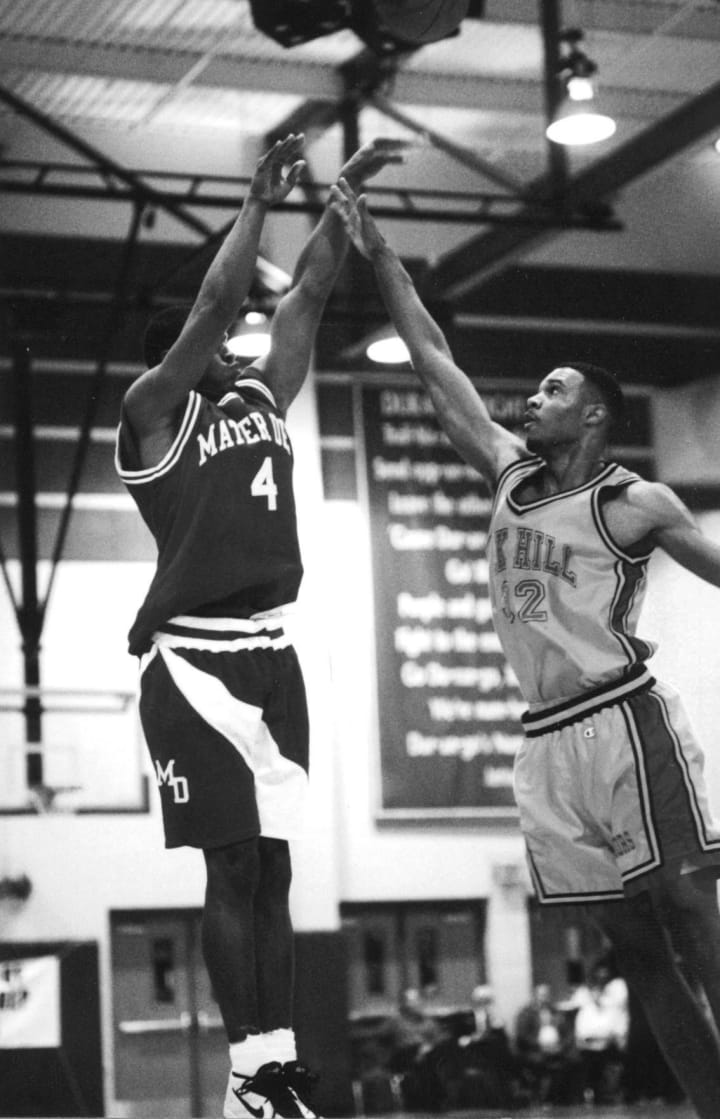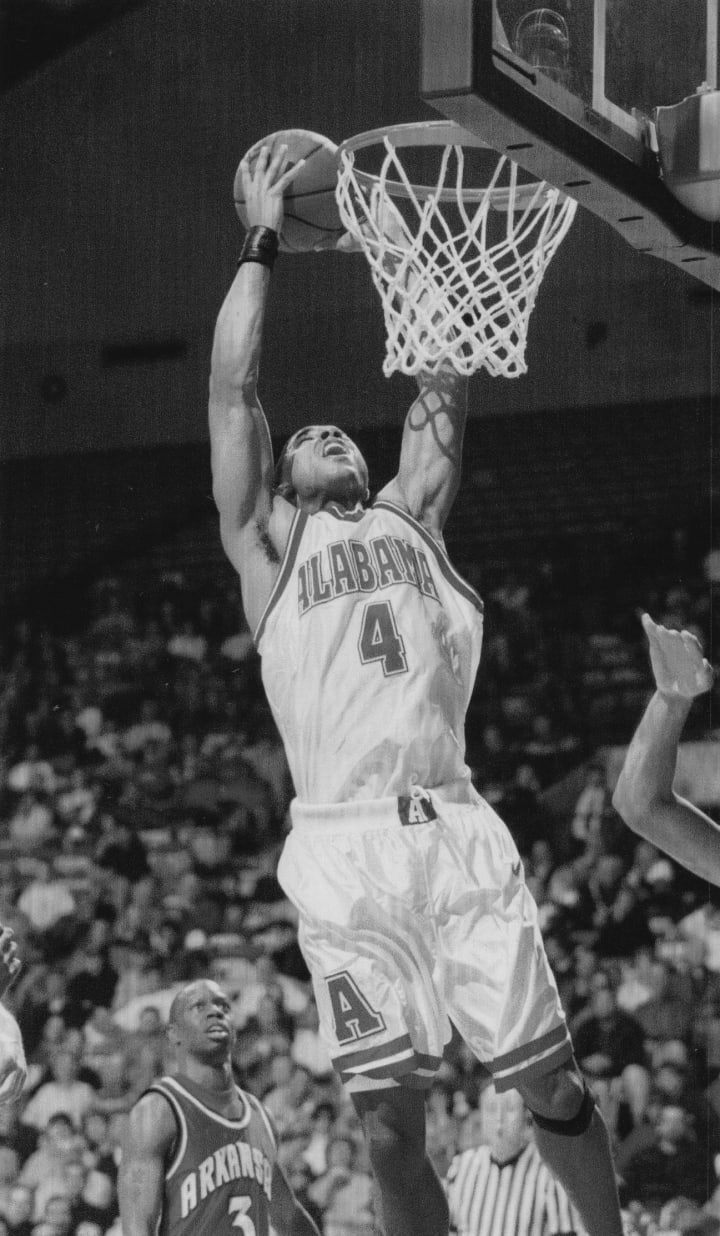Documentary Review: 'Manchild: The Shea Cotton Story'
How did the ultimate 'Can't miss' end up missing?

The term 'Manchild' has a negative connotation these days. The term is used as a shorthand for a legitimate psychological issue called 'Peter Pan Syndrome.' It's a disorder for people who are unable to feel like grown ups. The term is used these days in a more colloquial sense. Manchild is used often to criticize men who exhibit childish behavior. The term has olde English origins but it could be argued that it took on a more colloquial meaning in 1990 when a young man from California named Shea Cotton emerged on the national basketball scene.
At a mere 12 years old, Shea Cotton stood over six feet tall and on the basketball court was often accused of being far older than 12 due to his dominant presence and talent. In the new documentary Manchild: The Shea Cotton Story, a journalist actually claims to have brought the term back to common use as the one way he could think of to describe just how incredible Shea Cotton was as a mere child of 12 with the talent of an NBA superstar.

Shea Cotton was born in Inglewood, California in 1978 to Gaynell and James Cotton Sr. Sports were decided upon for Shea as a way to avoid violence, drugs and gangs, a story familiar to many famous athletes. Baseball was the first choice but as Gaynell explains charmingly in the documentary, she was afraid of Shea and his older brother, James Jr, getting hit by the ball. Thus they switched to basketball and a lifelong obsession was born.
The Cotton boys would battle each other fiercely on the court before their mother insisted they separate, not before Shea began getting the better of his supremely talented big brother. In Junior High, Shea Cotton began to grow and get much, much taller than the kids around him. By the age of 12 years old, Shea was over 6 feet tall but remained agile and light on his feet. Hard work gave Shea footwork and body control that made him stand out nearly as much as his height.
It wasn’t long before playing for AAU teams got Shea on the radar of College Basketball Coaches, several years before he’d ever be eligible. Shea was a talent unlike any other at the time and the sky was the limit. Eventually, Shea would be recruited to Performance Training Institute and Issy Washington’s Slam N Jam team, a California legend for providing a competitive place for kids to play year round and with access to some of the biggest names in college basketball as the cherry on top.
That’s the primer for stories of Shea Cotton growing up and gaining even more notoriety as he faced off in High School and AAU Basketball with the biggest names of his day including the likes of Kevin Garnett and Kobe Bryant. According to the documentary, Cotton defeated both Garnett and Kobe handily at different points in his remarkable AAU run that included numerous accolades. So what happened? Why don’t you know who Shea Cotton is if he was that good?
Manchild: The Shea Cotton Story, doesn’t have a satisfying answer to that question. By all indications, Shea Cotton was loved and respected everywhere he went. His talents were matched by character instilled by loving and firm parents who made sure he had a secure home life. There are hints of why Shea never made it to the heights of the NBA as his Nike contract at 12 YEARS OLD appeared to promise. But there is no one definitive answer.
Not that the documentary, from first time documentary feature director Eric ‘Ptah’ Herbert, needs a definitive answer really. There are enough intriguing questions to make the story of Shea Cotton compelling even if there isn’t one good reason why he never made it. Unfortunately, this is a very short and slight documentary that doesn’t exploit those intriguing questions. For instance, Shea’s brother James, who did make it to the NBA, raises a question about Shea’s college experience at the University of Alabama.

I will leave you to discover what James says but it appears to indicate that the coach, Bob Gottlieb, who is also featured in the documentary, did Shea a grave disservice in how he played him. Gottlieb is never confronted with this question. Instead, Gottlieb acts as an ally and champion of Shea despite James’s contention which is shoved aside despite being one of the more interesting aspects of the documentary.
Instead, the documentary doesn’t appear all that interested in probing the remarkably bad luck that plagued Shea’s college basketball and NBA dream. The documentary rushes through portions of conspiracy theories about how Shea was undermined before he could join the UCLA Bruins, how he somehow failed initially to find another college to take him on, and how he wound up playing a 5th year of High School as a result.
These bizarre circumstances are brushed aside so we can rush to the uplifting story of how Shea Cotton has turned his cautionary tale into something positive. Now well out of pro basketball, where he’d lingered on the fringes, outside the NBA, for a decade, Shea now teaches kids how to avoid the pitfalls of the AAU-High School to College Basketball meat grinder. Shea is indeed inspiring but even in this segment, the movie comes up short.
At only 68 minutes, feature length in intention only, Manchild: The Shea Cotton Story, boils down to platitudes about Shea’s almost ludicrous talents, attested to by many of his peers. Paul Pierce, Barron Davis, and Football star Randy Moss and a host of lesser name guys who all played in the NBA, spin tales of Shea’s amazing exploits over footage recorded by Shea’s father James, who recorded as much as he possibly could of his son’s career.

It’s a fine aesthetic but it fails to scratch the surface of what makes Shea Cotton’s story so intriguing. How did a 12 year old child get a Nike contract? How did he end up playing at numerous High Schools and on countless AAU teams? How is this system of exploitation of children structured and how many Shea Cotton’s never had a movie made about them? This system of exploitation that ate up Shea Cotton and threw him away when he looked to proceed is one that needs a closer examination.
Manchild: The Shea Cotton Story does not have the time or the ambition to tell that story. The documentary is available on streaming services on June 23rd.
About the Creator
Sean Patrick
Hello, my name is Sean Patrick He/Him, and I am a film critic and podcast host for the I Hate Critics Movie Review Podcast I am a voting member of the Critics Choice Association, the group behind the annual Critics Choice Awards.






Comments
There are no comments for this story
Be the first to respond and start the conversation.